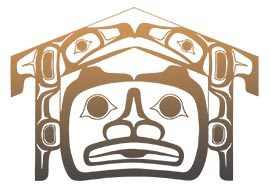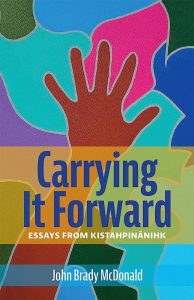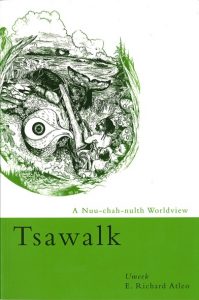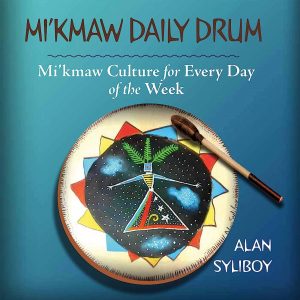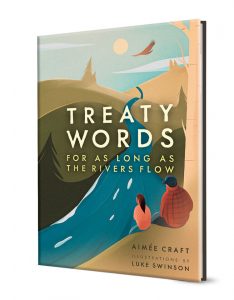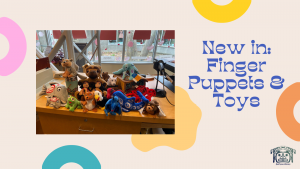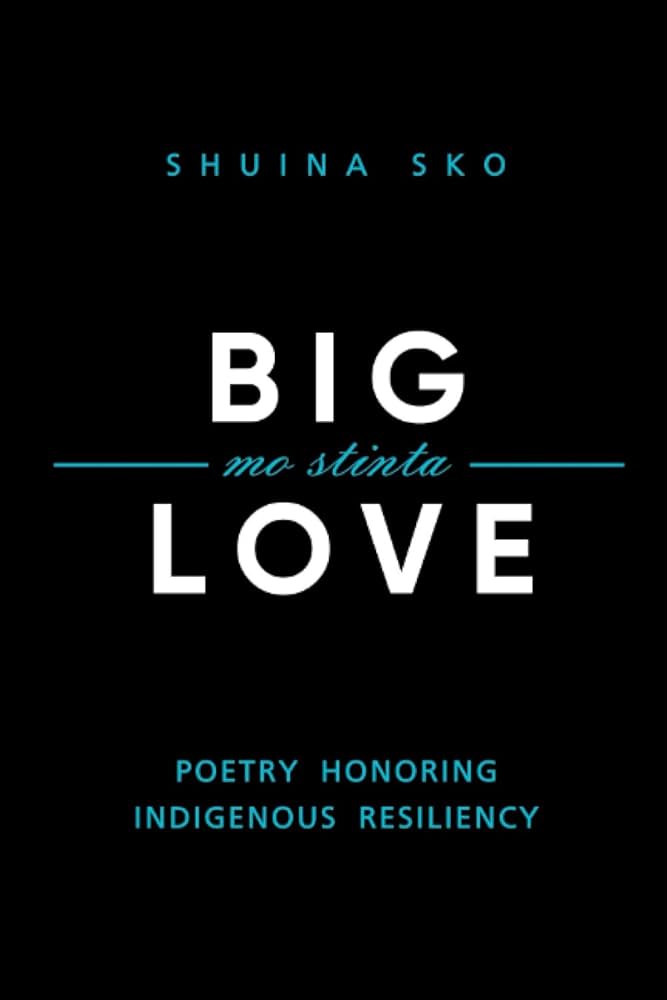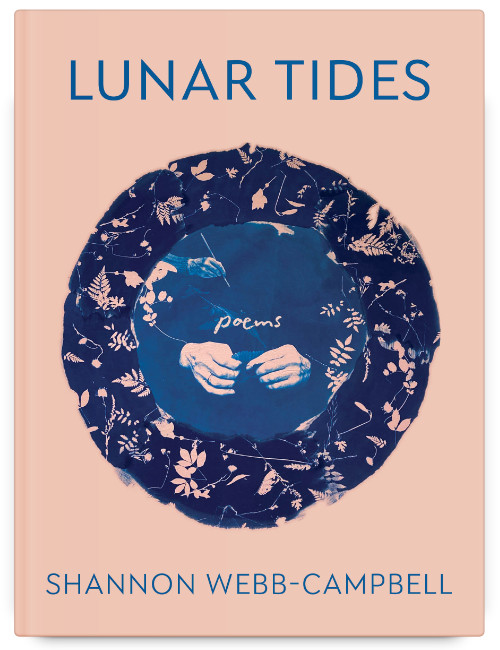The collections currently comprise approximately 12,000 items including about 6,000 books, 450 videos, 5,000 vertical file materials, curriculum resources, journals and newspapers, maps, posters, theses and dissertations, the G.A. (Bud) Mintz special collection, and some archival materials. The collections focus on First Nations in British Columbia, including contextual materials on Canadian First Nations, in addition to issues of national and international interest to First Nations and Indigenous peoples. X̱wi7x̱wa collects materials written from First Nations perspectives, such as materials produced by First Nations, First Nations organizations, tribal councils, schools, publishers, researchers, writers and scholars.
Featured collections
Staff Picks for July
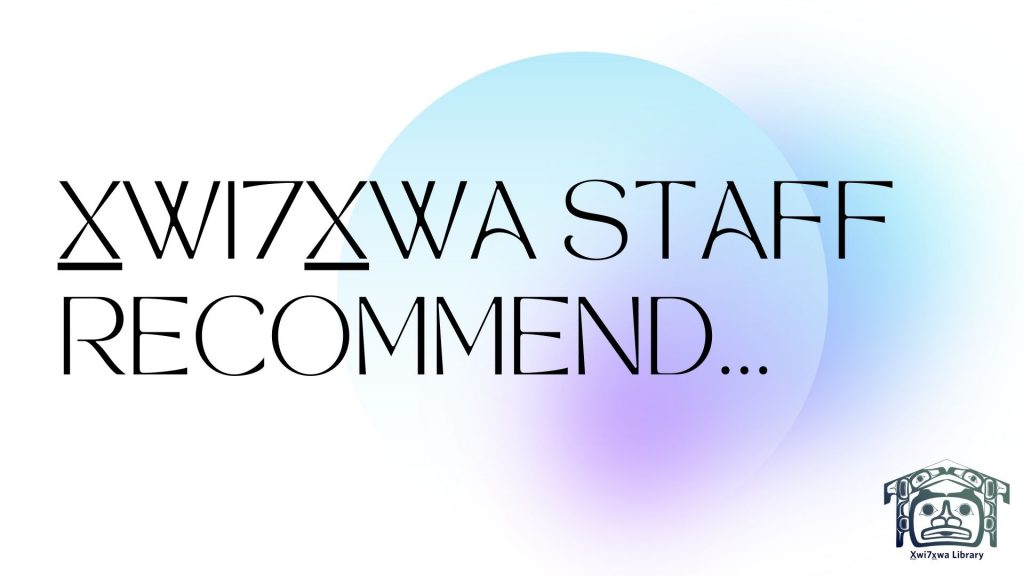
It’s summer reading time! Drop into the branch to pick up some books to read on the beach, at the lake, or on campus. X̱wi7x̱wa staff have done the work of recommending them for you, too!
If you want fiction…
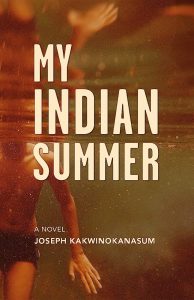
My Indian Summer by Joseph Kakwinokanasum
Call number: YF K35 M9 2022
Recommended by Emma: “Feel the scorching heat of summer 1979! Hunter is a 12-year-old boy determined to make it out of his town, no matter what. The author’s first book is a vivid story of youth, survival, and of multiple distinct lives coming together with Hunter at the centre.”
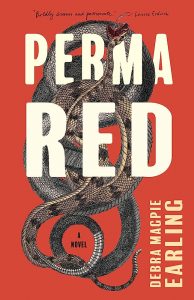
Perma Red by Debra Magpie Earling
Call number: YF E27 P47 2022
Recommended by Mira: “Earling’s prose is GORGEOUS – rich, atmospheric, descriptive, she fully immerses you in life on the Flathead Reservation in the 1940s. Her characters are fascinating and complex, and the novel deals with themes of freedom, assimilation, resistance, colonization and connection to land. Loved it.”
More books we’re excited about reading this summer:
- All The Quiet Places by Brian Thomas Isaac
- Laughing with the Trickster: on sex, death, and accordions by Tomson Highway.
- My Good Man by Eric Gansworth
Nonfiction/essays…
Carrying It Forward: essays from Kistahpińnihk by John Brady McDonald
Call number: YR M367 C37 2022
Recommended by Joe: “The author has a really interesting backstory and has done some cool stuff. He’s only recently been accepted by publishers after changing his name from John A. McDonald, but has a lot to say in this book (e.g., the time he announced his discovery of the UK and claimed it for Indigenous people).
Tsawalk: a Nuu-chah-nulth worldview by Umeek (E. Richard Atleo)
Call number: BF A85 T73 2004
Recommended by Mira: “This book kinda blew my mind and broke my brain. Umeek describes Nuu-chah-nulth worldview by retelling stories and oral histories, and it’s amazing… You just gotta read it.”
More nonfiction we’re excited about reading this summer:
- Rehearsals for Living by Robyn Maynard & Leanne Betasamosake Simpson
- Jesintel: living wisdom from Coast Salish elders, edited by Darrell Hillaire and Natasha Frey
- A Mind Spread Out On The Ground by Alicia Elliott
Books to read with kids…
Mi’kmaw daily drum: Mi’kmaw culture for every day of the week by Alan Syliboy.
Call number: XCF S95 M55 2020
Recommended by Taya: “I love Alan Syliboy’s art and how his books show the vibrancy of Mi’kmaw culture.”
Treaty Words: for as long as the rivers flow by Aimée Craft, illustrations by Luke Swinson.
Call number: YUB C739 T74 2021
Recommended by Emma: “Beautiful immersive illustrations accompany this flowing text about what treaty means, told through a conversation between a girl and her Mishomis.”
More children’s books we’re excited about reading this summer:
- 47,000 Beads by Koja Adeyoha and Angel Adeyoha ; illustrated by Holly McGillis
- Wild berries / Pikaci-Mīnisa by Julie Flett
- Powwow Day by Traci Sorell; illustrated by Madelyn Goodnight
That’s all for us! Enjoy the summer and curl up with a book or two.
P.S.: If you want tailor-made reading recommendations, feel free to drop by the branch Mon-Fri, 11-3, and chat with one of us! Or you can email xwi7xwa.library@ubc.ca anytime.
New Finger Puppets and Toys at Xwi7xwa Library!
As part of our connections to NITEP, the Indigenous Teacher Education Program, here at X̱wi7x̱wa Library we have a strong focus on educational resources. We recently received our newest addition to our collection: some brand new finger puppets and toys. These are ideal for storytimes, circle time, or other classroom activities. They’re also great for anybody bringing little ones by the branch!
Come by the branch to take a look at our new collection of finger puppets and toys, which are available to borrow now. Click here to view our new finger puppets, and here to view our new First Nations plush toys. Below we are introducing our new toys, as well as some featured books that one of our wonderful student hosts, Grace, has paired with them!
Introducing…
Grizzly the Bear and Oly the Brown Bear
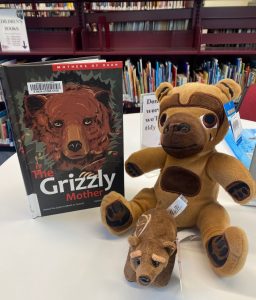
Featured Book: The Grizzly Mother by Hetxw’ms Gyetxw (Brett D. Huson):
“To the Gitxsan people of Northwestern British Columbia, the grizzly is an integral part of the natural landscape. Together, they share the land and forests that the Skeena River runs through, as well as the sockeye salmon within it. Follow mother bear as she teaches her cubs what they need to survive on their own. The Mothers of Xsan series uses striking illustration and lyrical language to bring the poetry of the Xsan ecosystem to life.”
Hummy the Hummingbird, Trickster the Raven, Gak the Raven, and Valdy the Eagle
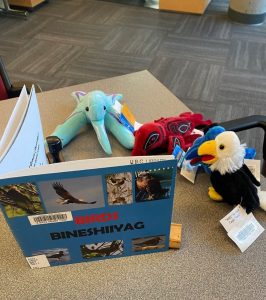
Featured Book: Birds: Bineshiiyag
“This beautiful picture book features the birds of Neyaashiinigmiing with descriptions in both Ojibwe and English.” – publisher’s website.
Moka the Spirit Bear
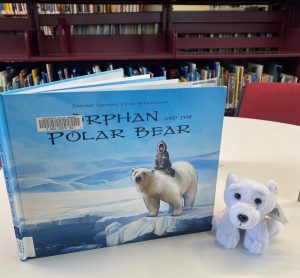
Featured Book: The Orphan and the Polar Bear, retold by Sakiasi Qaunaq
“In The Orphan and the Polar Bear, a little orphan who has been abandoned on the sea ice by a group of cruel hunters is discovered and adopted by a polar bear elder. While living in the bear‘s village, the orphan learns many lessons about survival and his own place in the world.”
Sammy the Salmon, Jr. and Sr.
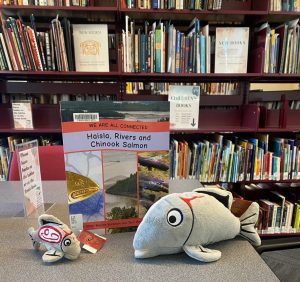
Featured Book: Haisla, rivers and chinook salmon by Joe Starr, Brenda Boreham and Terri Mack
In the We Are All Connected series, “Traditional storytelling and artwork begin each title from the focus Indigenous territory. Science: Biodiversity, classification, life cycles, food chains, food webs and connections between living and non-living things are just some of the science concepts included in each book. Social Studies: Contemporary and historical Indigenous cultural knowledge flows throughout each book. Local land forms, gatherings, harvesting practices and government are some of the social studies concepts included in each book.”
Bucky the Beaver
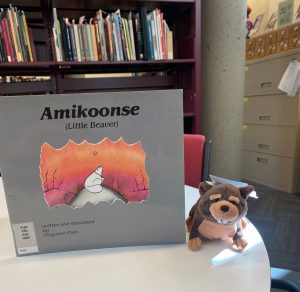
Featured Book: Amikoonse (Little Beaver) by Ferguson Plain
“Amikoonse has never known his true place in the world. He must discover his identity, spiritually and physically, in order to achieve his destination in life. With help from ol’ owl, Amikoonse takes a journey through the woods to find himself.”
Trickster the Raven and Laksoo the Wolf
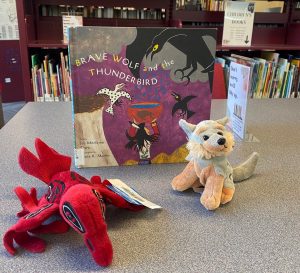
Featured Book: Brave Wolf and the Thunderbird by Joe Medicine Crow ; illustrations by Linda R. Martin
“While hunting, Brave Wolf is snatched by a hugh Thunderbird and taken to her nest on a high cliff so he can protect her chicks from a monster.”
Luna the Whale and Gispy the Orca Whale
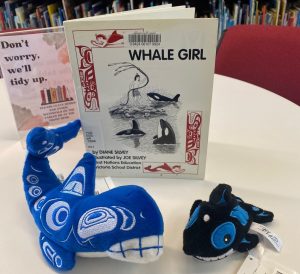
Featured Book: Whale girl by Diane Silvey and Joe Silvey
“Peta loved all the things around her, the forest, the plants and the animals. But most of all, she loved her friends the Killer Whales.”
National Poetry Month 2023 at Xwi7xwa Library!
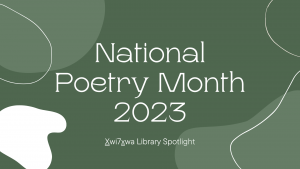
April is National Poetry Month in the US and Canada. Here at Xwi7xwa Library we are happy to present a reading list of innovative and moving poetry by Indigenous authors which showcase what is possible within and beyond the genre. Come by the branch to browse the rest of our collection (head straight to the call number ‘YP’ to browse all poetry) or search the UBC Catalogue for “poems” and filter for: “Location: Xwi7xwa Library”.
To learn more, visit our Indigenous Poetry & Poets Research Guide.
it was never going to be okay by jaye simpson is the author’s first book. This collection of prose and poetry explores themes including the foster care system, sexuality and love as a trans woman, Indigeneity and queerness, and navigating family relationships through Intergenerational Trauma. jaye simpson is an Oji-Cree Saulteaux Indigiqueer writer and activist from the Sapotaweyak Cree Nation, with Scottish and French settler ancestry.
You Might Be Sorry You Read This by Michelle Poirier Brown is a poetic memoir that looks unflinchingly at childhood trauma and tells the story of coming to terms with a hidden Indigenous identity when the poet discovered her Métis heritage at age 38. Michelle Poirier Brown is a poet and performer living in BC. Originally from Selkirk, Manitoba, she is nêhiýaw-iskwêw and a citizen of the Métis Nation.
You are enough: love poems for the end of the world by Smokii Sumac is the culmination of a two-year daily poetry practice which originally began under the hashtag #haikuaday. Split into six parts, including ‘#courting: on dating and gender and falling in (and out) of love’ and ‘#theworld: a constant state of grief’, the end result is a two-year journey through the life of Smokii Sumac, a Two-Spirit person, member of the Ktunaxa nation, and PhD candidate in Indigenous Studies at Trent University.
Big Love / mo stinta: Poetry Honoring Indigenous Resiliency by Shuína Skó combines 13 poems on Indigenous resiliency, storytelling, power and empowerment in the face of trauma and oppression. Shuína Sko is a a Two-Spirit storyteller and spoken word poet, author, and Indigenous rights activist. Shuína is a lifelong member of The Klamath Tribes.
The Wound is a World by Billy-Ray Belcourt is an award-winning collection of poetry which upsets genre and plays with form, pursuing new directions for queer and decolonial theory. Billy-Ray Belcourt is a writer from the Driftpile Cree Nation.
kiyâm: poems by Naomi McIlwraith is an exploration of the intersection between nêhiyawêwin, the Plains Cree language, and English, âkayâsîmowin, as well as of the relationship between the European literary tradition and oral traditions of the First Nations and Métis. With a foreword from Jenna Butler, the book includes a pronunciation guide, notes on the poems, Cree-English correspondences, and a bibliography. Naomi McIlwraith is an educator, poet, and essayist, with a mixed Cree, Ojibwe, Scottish, and English inheritance.
Approaching Fire by Michelle Porter is a journey to find the author’s great-grandfather, Métis fiddler and performer Léon Robert Goulet. A mixture of poetry, photographs, newspaper clippings, jigs and reels, musicology, and the ecology of fire, Porter’s moving exploration braids together history, genealogy, and poetry. Michelle Porter is a prairie Métis living in Newfoundland and Labrador. She is a poet, journalist, and writer.
Kiskajeyi – I AM READY by Michelle Sylliboy uses symbols from the Komqwejwi’kasikl writing system maintained by the author’s ancestors to create poems, combining these with poems in English and photographs to recognize the land and the ways in which the Komqwejwi’kasikl language comes from this land. The weaving of modern poetry, hieroglyphic poetry, and images creates a book celebrating Indigenous languages. Michelle Sylliboy is a Mi’kmaw (L’nu) artist and author born in Boston, Massachussetts and raised on unceded territory in We’koqmaq, Cape Breton.
As Long as the Sun Shines by Janet Rogers is the author’s sixth published poetry collection. Split into three parts, ‘Nations March Together’, ‘Proof of Power’ and ‘Singing the Peace Hymn’, this collection is an emotional journey towards inner peace inspired by the author’s travels, experiences, relationships, and her Haudenosaunee perspective.
Full-Metal Indigiqueer by Joshua Whitehead is visual art and poetry together as one. It “focuses on a hybridized Indigiqueer trickster character named Zoa who brings together the organic (the protozoan) and the technologic (the binaric) to re-beautify and re-member queer Indigeneity”. Joshua Whitehead is an Oji-Cree, Two-Spirit storyteller and academic from Peguis First Nation on Treaty 1 territory in Manitoba.
river woman by Katherena Vermette examines and celebrates love as decolonial action, where love is reclamation and repair in times of trauma. This work highlights the importance of language within the body and its role in healing, and explores Vermette’s relationship to nature, land, and water. Katherine Vermette is an award-winning Métis writer from Treaty One territory.
Cut to Fortress by Tawahum Bige is the author’s debut poetry collection, confronting colonialism, relationships, grief, and intergenerational wounds. Tawahum Bige is a Łutselk’e Dene, Plains Cree poet living on unceded Musqueam, Squamish, and Tsleil-Waututh territory.
Exhibitionist by Molly Cross-Blanchard is dedicated to “the young people who feel so embarrassed, all the time”. Embracing shame while acknowledging the all-encompassing nature of it, these poems engage in a funny, honest, sorry-not-sorry confessionalism. Molly Cross-Blanchard is a white and Métis writer and editor born on Treaty 3 territory (Fort Frances, ON) and raised on Treaty 6 territory (Prince Albert, SK).
Where the Sea Kuniks the Land by Ashley Qilavaq-Savard celebrates the interconnectedness of people and place in a gesture of love to the Arctic landscape. This collection of poetry is filled with beautiful images of the landscape and water, and takes the reader on a journey through seasons, reflecting on land, culture, and identity. It also includes a glossary of Inuktut words.
(Re)generation: The Poetry of Kateri Akwenzie-Damm by Kateri Akiwenzi-Damm bring together poems from different stages of the author’s writing, from her earlier works through to her spoken word works. This collection showcases her unwavering voice on a range of issues, in particular her writing in service of Indigenous brilliance, love, intimacy, and joy. Kateri Akiwenzie-Damm is a member of the Saugeen Ojibway Nation, Chippewas of Nawash Unceded First Nation, on the Saugeen Peninsula in Ontario. She is a poet, writer, spoken word artist, Indigenous arts advocate, and educator.
I Place you Into the Fire: Poems by Rebecca Thomas is “at once a meditation on navigating life and love as a second-generation Residential School survivor, a lesson in unlearning, and a rallying cry for Indigenous justice, empathy, and equality.” Split into three parts based on three similarly shaped words in Mi’kmaw: Kesalul (meaning, “I love you”), Kesa’lul (meaning “I hurt you”), and Ke’sa’lul (meaning, “I put you into the fire”), this is a collection about love and pain. Rebecca Thomas is an award-winning Mi’kmaw poet and Halifax’s former Poet Laureate.
I Will Be Corrupted by Joseph A. Dandurand is a collection of visceral poems that transport the reader to each scene described, creating a story of hope, loss, and redemption. Joseph A. Dandurand is a member of Kwantlen First Nation and has published 13 books of poetry.
Eskimo Pie: A Poetics of Inuit Identity by Norma Dunning brings together poetry and prose to create a reflection of the author’s lived experiences as an Inuk who was born, raised and continues to live south of sixty. Norma Dunning is an Inuit writer, scholar, professor, and grandmother.
Indigena awry by annharte collects a decade of poems: 59 total, split into six parts. “Set noticeably in Winnipeg and Vancouver, but in many other places on either side of the Medicine Line as well, the poems are a laser-eyed meander through contested streets filled with racism, classism, and sexism. Shot through with sex and violence and struggle and sadness and trauma, her work is always set to detect and confront the delusions of colonialism and its discontents.” Marie Annharte Baker is Anishinabe (Little Saskatchewan First Nations, Manitoba) and this is her fourth book of poems.
Lunar Tides by Shannon Webb-Campbell explores the “primordial connections between love, grief, and water, structured within the lunar calendar”. Shannon Webb-Campbell is a mixed Indigenous (Mi’kmaq) settler poet, writer, and critic. She is a member of Qalipu Mi’kmaq First Nation and lives in Kijpuktuk/Halifax in Mi’kma’ki.
Crow Gulch by Douglas Walbourne-Gough is the author’s debut poetry collection about Crow Gulch, a community on the shore of the Bay of Islands in Newfoundland made up of migrant workers, many of Indigenous ancestry, who were drawn to the area by the construction of Corner Brook’s pulp-and-paper mill. Douglas Walburne-Gough “finds his own identity within the legacy of Crow Gulch and reminds those who have forgotten of a glaring omission in history.” Douglas Walbourne-Gough is a mixed/adopted member of the Qalipu Mi’kmaq First Nation from Corner Brook, NL.
Father / Genocide by Margo Tamez “reconstructs her father’s struggle to “be a man” under American domination while tracing the settler erasure, denial, and genocide that he and preceding generations experience”. Her poetry is timebending and makes use of a poetic form Tamez calls Indigenous fusionism-Indigenous futurism. Margo Tamez is a poet, herstorian, activist, and documenter of human rights violations across the Lipan tribal homelands. She is an enrolled citizen of the Lipan Apache Band, Texas.
30th Annual February 14th Women’s Memorial March
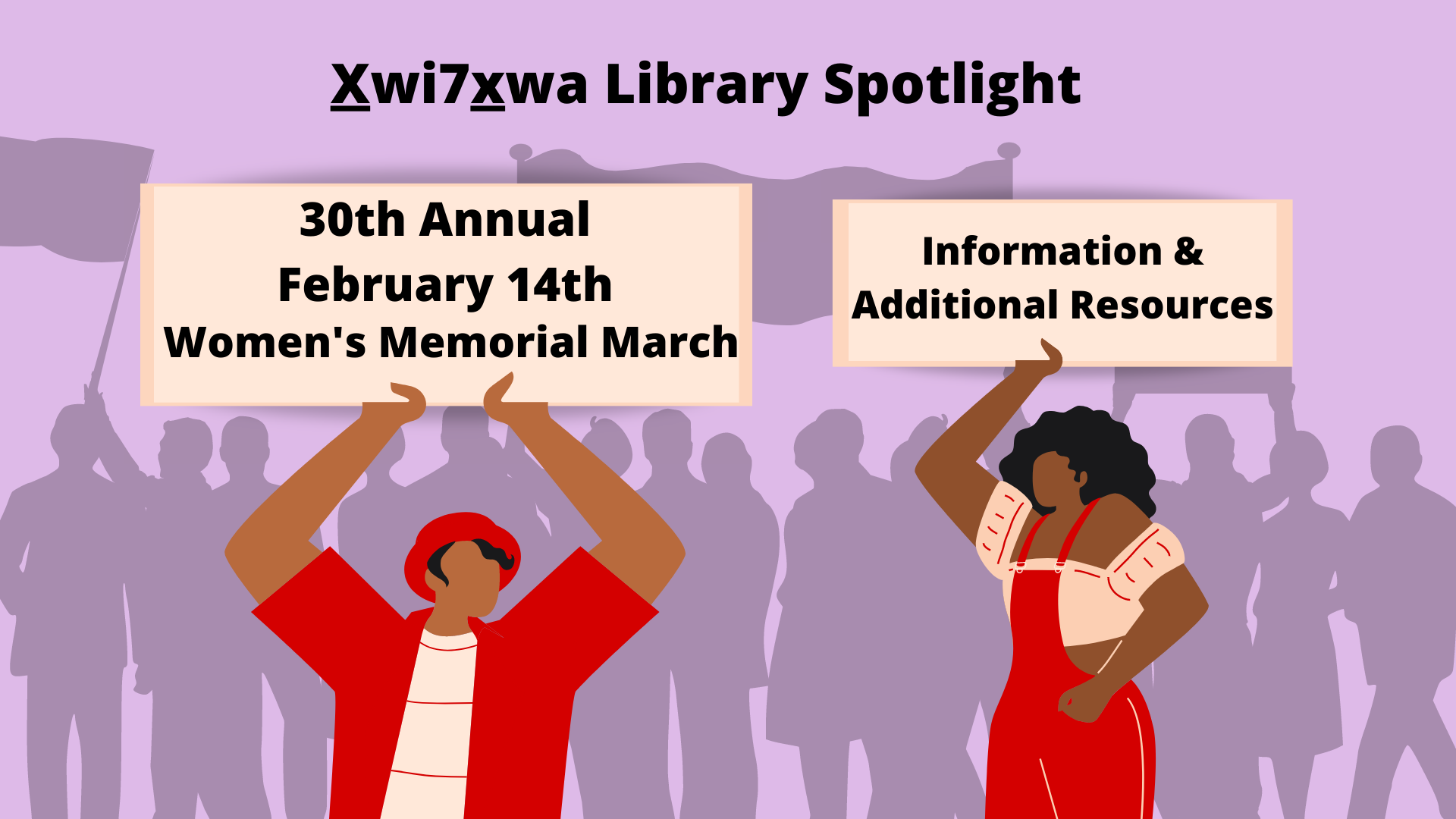
Since the 1970s dozens of women, including many Indigenous women, living in Vancouver’s Downtown Eastside have been murdered or gone missing. The first Women’s Memorial March took place in 1992 to commemorate the life of a woman murdered on Powell Street and it has been held ever since to honour all women living in the Downtown Eastside.
The 30th Annual Women’s Memorial March happens on Sunday, February 14th 2021. The march starts at 12:00 PM from Main and Hastings (Carnegie Community Centre). There will be stops along the way to commemorate where women were last seen or found; speeches by community activists at Main and Hastings; a healing circle at Oppenheimer Park around 2:30 PM; and a social distanced community feast at the Japanese Language Hall. Physical distancing and masks are required. The march will also be live streamed. Please see the “February 14 Women’s Memorial March DTES” Facebook page for more information.
Additional Resources
Indigenous women living in the Downtown Eastside face disproportionate levels of violence, poverty and racism. To learn more about the experiences of Indigenous women living in the Downtown Eastside, please see the resources below.
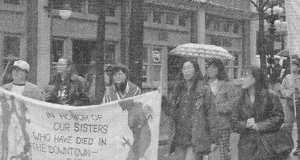
“Survival, Strength, Sisterhood: Power of Women in the Downtown Eastside” by Alejandro Zuluaga and Harsha Walia: A short film that documents the 20 year history of the annual Women’s Memorial March for missing and murdered women in Vancouver, Coast Salish Territories. By focusing on the voices of women who live, love, and work in the Downtown Eastside this film debunks the sensationalism surrounding a neighbourhood deeply misunderstood, and celebrates the complex and diverse realities of women organizing for justice.
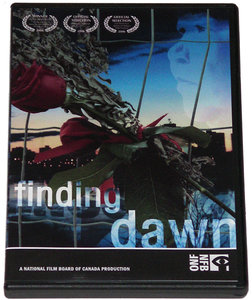
“Finding Dawn” by Christine Welsh: Dawn Crey. Ramona Wilson. Daleen Kay Bosse. These are just three of the estimated 500 Indigenous women who have gone missing or been murdered in Canada over the past thirty years. Directed by acclaimed Métis filmmaker Christine Welsh, Finding Dawn is a compelling documentary that puts a human face to this national tragedy. This is an epic journey into the dark heart of Indigenous women’s experience in Canada. From Vancouver’s skid row, where more than 60 women are missing, we travel to the Highway of Tears in northern British Columbia, and onward to Saskatoon, where the murders and disappearances of Indigenous women remain unresolved. Along the road to honour those who have passed, we uncover reason for hope. It lives in Indigenous rights activists Professor Janice Acoose and Fay Blaney. It drives events such as the annual Women’s Memorial March in Vancouver and inspires communities all along the length of Highway 16 to come together to demand change. Finding Dawn illustrates the deep historical, social and economic factors that contribute to the epidemic of violence against Indigenous women in this country. It goes further to present the ultimate message that stopping the violence is everyone’s responsibility. Find this film at UBC online or at X̱wi7x̱wa Library.
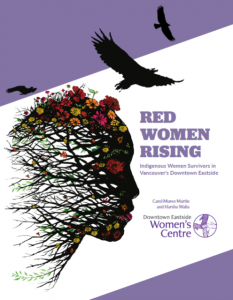
“Red Women Rising” report: Red Women Rising is an extraordinary report with Indigenous women survivors at the center; rather than as a secondary reference. Indigenous women in the Downtown Eastside (DTES)—a neighbourhood known as ground zero for violence against Indigenous women—are not silent victims, statistics, or stereotypes. This unprecedented work shares their powerful first-hand realities of violence, residential schools, colonization, land, resource extraction, family trauma, poverty, labour, housing, child welfare, being two-spirit, police, prisons, legal system, opioid crisis, healthcare, and more.
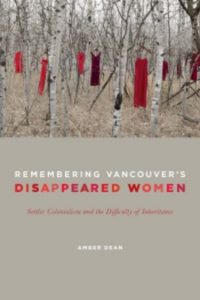
“Remembering Vancouver’s Disappeared Women: Settler Colonialism and the Difficulty of Inheritance” by Amber Dean: Between the late 1970s and the early 2000s, at least sixty-five women, many of them members of Indigenous communities, were found murdered or reported missing from Vancouver’s Downtown Eastside. In a work driven by the urgency of this ongoing crisis, which extends across the country, Amber Dean offers a timely, critical analysis of the public representations, memorials, and activist strategies that brought the story of Vancouver’s disappeared women to the attention of a wider public. Remembering Vancouver’s Disappeared Women traces “what lives on” from the violent loss of so many women from the same neighbourhood. This book is available online or physically from X̱wi7x̱wa Library.
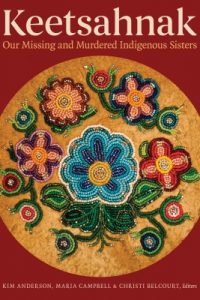
“Keetsahnak / Our Missing and Murdered Indigenous Sisters” (Chapter 1) edited by Kim Anderson, Maria Campbell and Christi Belcourt: In Keetsahnak / Our Murdered and Missing Indigenous Sisters, the tension between personal, political, and public action is brought home starkly as the contributors look at the roots of violence and how it diminishes life for all. Together, they create a model for anti-violence work from an Indigenous perspective. They acknowledge the destruction wrought by colonial violence, and also look at controversial topics such as lateral violence, challenges in working with “tradition,” and problematic notions involved in “helping.” Through stories of resilience, resistance, and activism, the editors give voice to powerful personal testimony and allow for the creation of knowledge. This book is available online or physically from X̱wi7x̱wa Library.
For additional information and research help, please see X̱wi7x̱wa Library’s “Missing and Murdered Indigenous Women & Girls (MMIWG)” research guide.
X̱wi7x̱wa Spotlight: Loveable Reads for Valentine’s Day & Reading Week
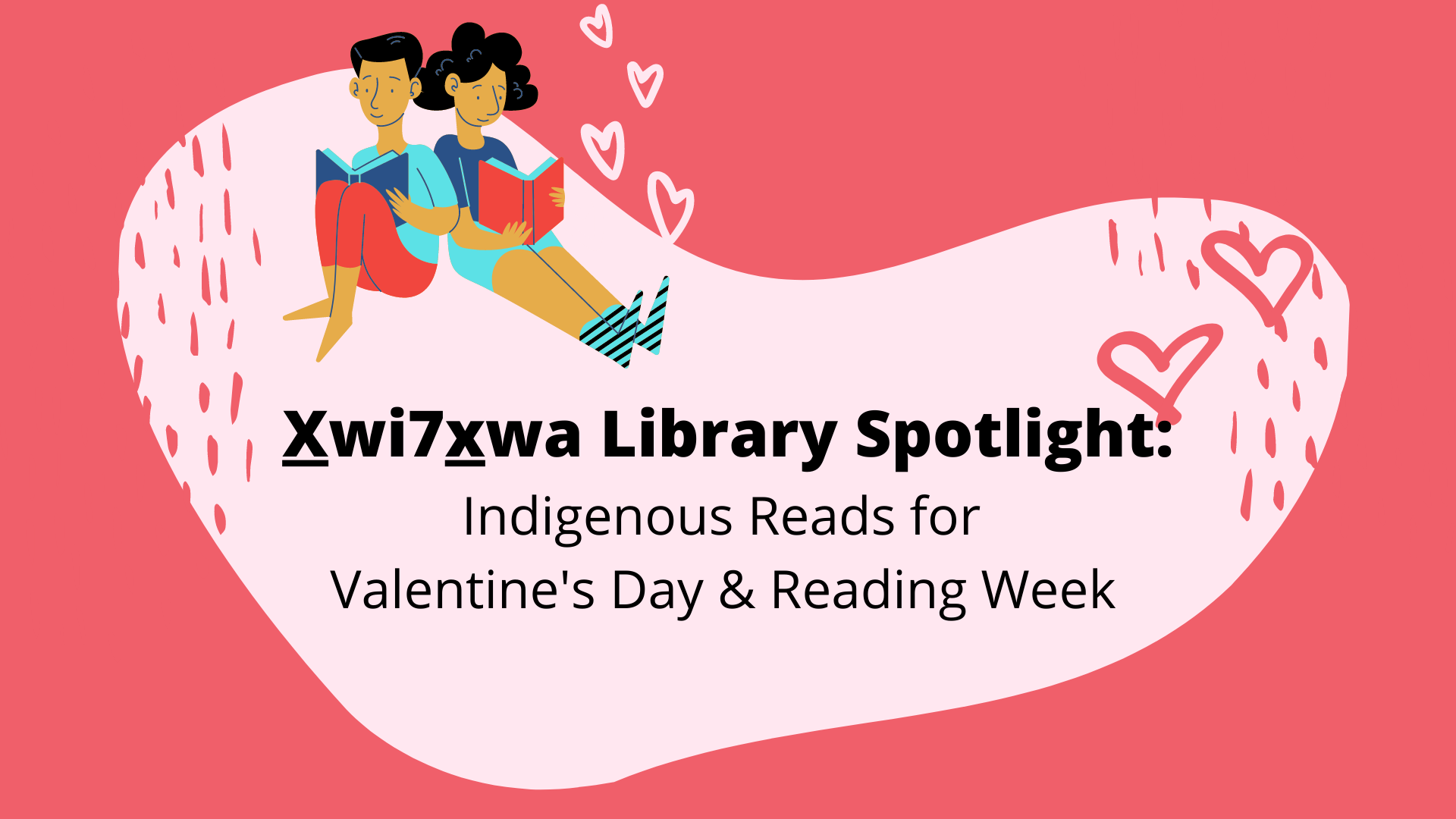
Need a break from academia? We’ve put together a selection of love-themed Indigenous reads for you and your family this Valentine’s Day and Reading Week. Find these resources at UBC’s Xwi7wxa Library or check your local public library.
Want even more loveable reads? Check out last year’s Valentine’s Day reading list.

The Bear’s Medicine, written and illustrated by Clayton Gauthier, is a story of a mother’s love for her children as she teaches them how to survive. The Bear’s Medicine shows the interconnectedness of all things in the world they live in and how each season brings changes and blessings for the bears. Words in English and Dakelh.
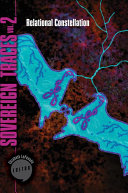
Relational Constellation, an anthology edited by Elizabeth LaPensée, provides a unique opportunity for audiences to hear from a myriad of American Indian and First Nations voices on the meaning of love. Here readers will find works of graphic literature, including both poetry and fiction, that explore how celestial bodies build and share creative intimacies.
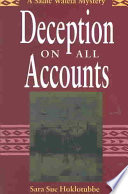
Deception on All Accounts by Sara Sue Hoklotubbe is a novel for folks who like their mysteries spiced with some romance. This story follows the character Sadie Walela as she navigates identify, murder, love and her career and faces deception on all accounts. Check out the other books in the Sadie Walela series for more. Find this book at UBC in the library and online.

Genocidal Love: A Life After Residential School, by Bevann Fox, is a novel that weaves truth and fiction to examine “A residential school survivor’s complicated path toward healing and love. Genocidal Love delves into the long-term effects of childhood trauma on those who attended residential school and demonstrates the power of story to help in recovery and healing.” This book is currently on order at UBC and X̱wi7x̱wa Library, but is available at Vancouver Public Library.

Birdsong, by Julie Flett. When a young girl moves from the country to a small town, she feels lonely and out of place. But soon she meets an elderly woman next door, who shares her love of nature and art. As the seasons change, can the girl navigate the failing health of her new friend? Acclaimed author and artist Julie Flett’s textured images of birds, flowers, art, and landscapes bring vibrancy and warmth to this powerful story, which highlights the fulfillment of intergenerational relationships and shared passions. Words in Cree and English.

You Are Enough: Love Poems for the End of the World, Sumac Smokii: A curated selection from hundreds of poems written over two years of a near-daily haiku practice. Sections of selected poems such as ‘recovery,’ ‘courting,’ and ‘ceremony,’ tell a story of what 2016-2018 was like in the life of a two-spirit, transmasculine, Ktunaxa PhD Candidate in [his] late 20s, living in Peterborough Ontario.

Zaagi’idiwin: Silent, Unquestionable Act of Love by Leanna Marshall, creates an intersection where viewers meet to understand and explore the essence of relationships, the meaning of connection/disconnection, and the pain of loss. Through the making and documentation of jingle dresses, Marshall explores the deeply personal stories that have shaped her perception of the complexities of her family history in the context of Canadian history. The social inequities, resistance, and sorrow communicated in this body of work serve as a springboard to examine the act of compassion and forgiveness, which ultimately helps to move forward to a new and more affirmative place of being.
